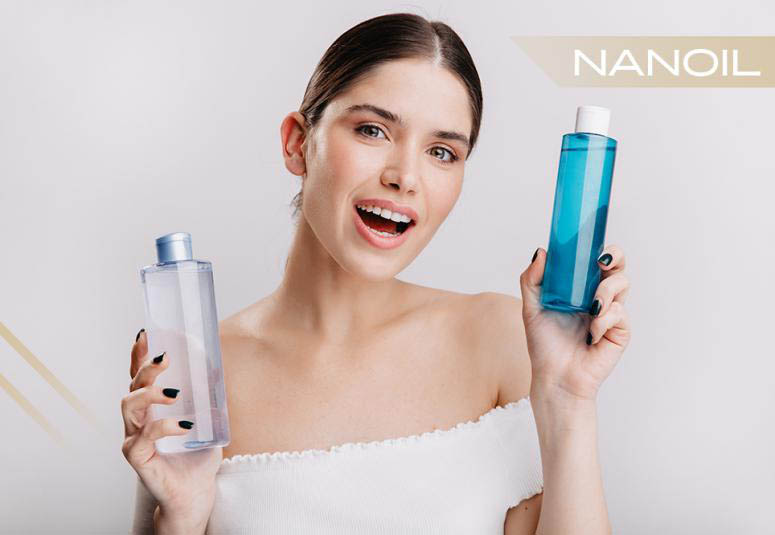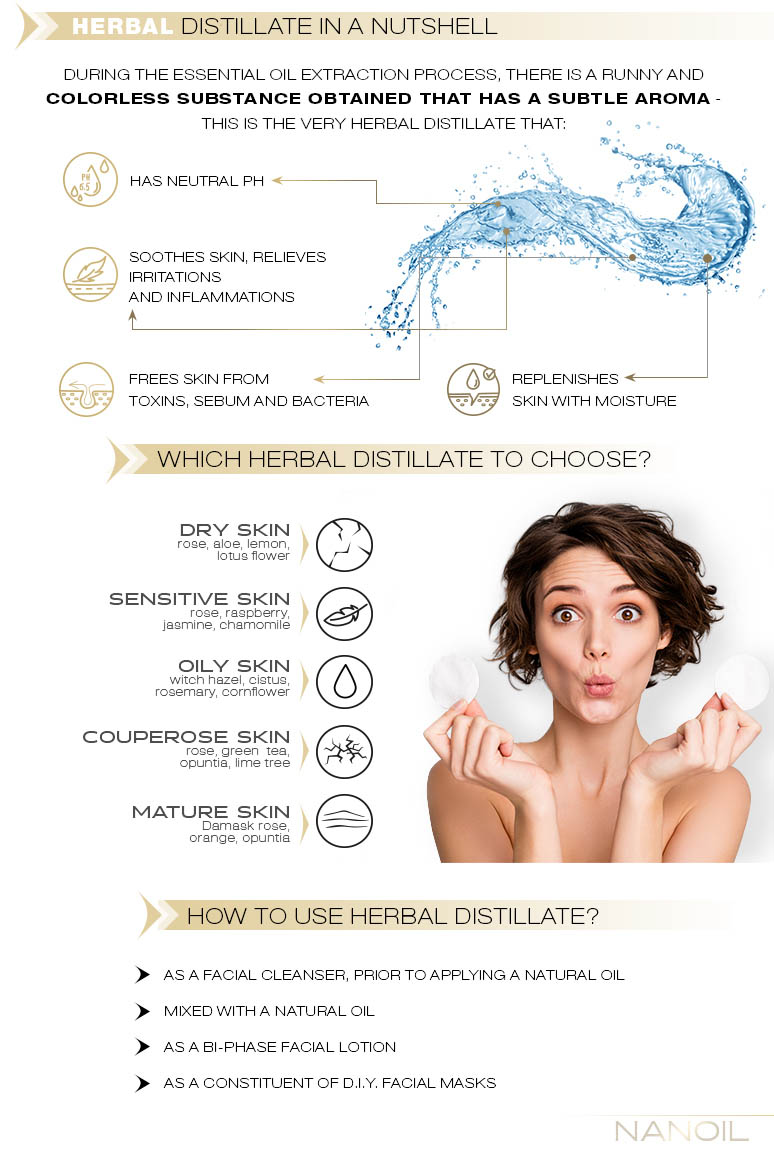- NANOIL Products
- Oils
- Face serums
- Hair masks
- Shampoos
- Hair conditioners
- Hair styling
- Care
- Hair Porosity Test
- Blog
- Contact

They soothe irritations, help skin regenerate and carry out self-renewal processes properly - this is how herbal distillates work. However, are they powerful enough to take the place of facial toners and lotions? What makes herbal distillates effective when used for skincare purposes? Today we're discovering the secrets of herbal distillates. Learn the most popular herbal distillates and their benefits.
It wasn't that long ago when just few heard about them, yet today, for many people, herbal distillates (e.g. moisturizing ones) constitute an integral part of daily skincare routine. Even though herbal distillates have taken the cosmetic industry by storm, still there are people who don't know what herbal water really is and how to use such products properly. It's high time to change this and discover all the benefits offered by herbal distillates.
What are herbal distillates? It's the same thing as: floral water, herbal water, hydrolates/hydrosols, essential waters - there are several names given to this one all-natural cosmetic.
The naturalness of herbal distillates is owed to the method of obtaining. The easiest way to explain what herbal distillate is, is by explaining its origins. Herbal distillate is a side product of essential oil production - the extraction process of herbs due to steam distillation. Once considered as useless, today their outstanding skin and hair improving abilities are highly appreciated worldwide.
Fun fact!
The word hydrolate has its origins in French language, where hydro stands for water and lait means milk.
Natural herbal distillates that are used for skincare purposes don't differ much from the distillates used to improve hair, which in fact are better known as hair hydrosols.
They are aqueous and have a really subtle aroma. Obviously, the plant a particular herbal distillate is extracted from determines the way its smells. Despite being colorless, there are some hydrosols that can be distinguished by their characteristic shade, and this applies to for example rosemary water, sage water or cinnamon water.
Still, it should be realized that a good herbal distillate - the one you want to treat skin with - must be free from additives: no colorants, synthetic aromas, preservatives. The simpler the formula, the better it is for our face skin.
Herbal distillate or face oil? Instead of wondering which natural product suits your skin better and which one delivers better results in daily skincare routine, you should make use of both!
Hydrosols are lighter and penetrate skin quicker to deliver hydration to the deepest skin layers. On the flip side, their effects are less apparent. Natural oils in turn are saturated with essential fatty acids and are able to prevent water loss. The effects delivered are definitely more dramatic. Together, they create a duo to handle special tasks!
Oils that you can combine with herbal distillates should be all-natural, cold-pressed and unrefined. Argan oil, almond oil and jojoba oil make the best choice but, of course, they aren’t the only oils that you can reach for.
Although combining both substances may appear to be fairly troublesome for some people, application of herbal distillates and oils to skin is workable. There are a few possibilities to give a try to.
Without a doubt, herbal distillates are beauty products that Mother Nature gave us. Recently, we have started appreciating such gifts more often because we became more conscious of the advantages that natural skincare offers.
Definitely, the biggest asset of herbal distillates is their neutral pH, therefore it's so easy for them to play in tune with our skin and restore balance to it. Neither do they irritate nor cause allergic reactions. What they do instead is just bring relief. Still, these aren't the only benefits of using herbal distillates for skincare. What are all the other properties of hydrosols?
Obviously, the majority of the above-mentioned properties are strictly connected with the benefits offered by a plant/herb a particular hydrosol is obtained from. Therefore, you can expect achieving different effects when using different floral waters and herbal waters.
Below you will find 10 most popular herbal distillates presented together with their effects on skin.

Which herbal distillate is the best to improve skin? There is no clear-cut answer to this question. Simply, you have to pick a hydrosol that answers needs of your skin. Below you will find tips that will help you choose the perfect herbal distillate for your face.
It has to be gentle which means that is shouldn't display the properties of astringent but deliver moisture. The best herbal distillates for dry skin are: rose water, lemon water, jasmine water, neroli and lotus flower water.
It’s supposed to soothe irritations and provide good skin protection. The best herbal distillates for sensitive skin are: again rose water, raspberry and aloe water, jasmine water as well as lavender and chamomile water.
Such skincare product should help oily glands function properly (deal with hyperactivity), cleanse, be antibacterial and balance skin's pH. The best herbal distillates for oily and acne-prone skin are: witch-hazels water, cistus water, rosemary water, strawberry water and cornflower water.
Instead of boosting blood flow, it should soothe irritations, bring relief to skin and make capillaries stronger. The best herbal distillate for couperose skin are: rose water, green tea water, opuntia water, lime water and Helichrysum italicum water.
Obviously, it must have an anti-age effect, moisturize, regenerate, improve skin suppleness and protect. The best herbal distillate for mature skin are: Damask rose water, orange floral water, witch-hazels water and opuntia water.
The easiest way to use herbal distillate for skincare purposes is to treat it as an alternative to a facial toner (especially when the toner you use is heavy, contains alcohol and dehydrates skin!)
How to do it? The simplest way of using herbal distillate on face depends on patting it into skin after face cleansing carried out in the evening. Just a really small amount of hydrosol helps you moisturize skin and soothe irritations. If you notice that the herbal distillate hasn't fully penetrated skin after a short while - so when the skin hasn't absorbed all of it - you can wipe the excess off with a cotton pad. The last step of natural skincare routine depends on applying a face cream as normal.
Comments: #0